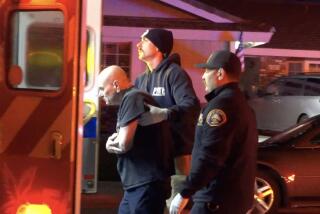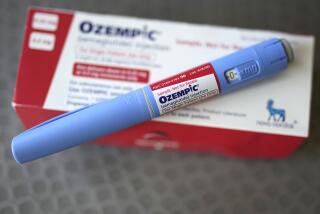Cold Capsules Are Recalled After 2 Deaths
- Share via
WASHINGTON — The manufacturer of Sudafed 12-hour cold capsules issued a nationwide recall of the product Sunday after two people who had taken the medication died of cyanide poisoning and a third became seriously ill.
Burroughs Wellcome Co. said that it took the action after being notified of the deaths this weekend and urged consumers to avoid taking the product, a time-release decongestant. Burroughs Wellcome advised consumers to return all Sudafed 12-hour capsules to the store where they had been purchased.
Officials of some drugstores and pharmacies in Orange County said Sunday that they had not immediately been notified of the recall, but added that by today all of the Sudafed 12-hour capsules should be off their shelves.
A pharmacist at a Thrifty Drug Store in Costa Mesa said she was not aware of the recall, but the manager of the store had cleared the shelves of the cold capsules after receiving information about the recall through the store’s office computer information service.
“Customers have called--concerned--and are coming in” to return the Sudafed bought there, said another Thrifty Drug store manager, who declined to give his name.
The deaths and the injury were confined to the Tacoma-Olympia, Wash., area.
“We are moving rapidly to alert the public and retrieve all Sudafed 12-hour capsules from the retail stores,” said Philip R. Tracy, president and chief executive officer of the company. “Our sympathies go to the families of the individuals involved, and they have our assurance that the company will investigate these incidents quickly and thoroughly,” he added.
The deaths came almost exactly five years after a cyanide-laced Tylenol capsule killed a Westchester County, N.Y., woman and nearly nine years after seven people died after taking cyanide-tainted Tylenol capsules in Chicago.
Those killings have never been solved. The deaths resulted in a nationwide scare over the safety of consumer products--which, until then, most Americans had taken for granted--and initiated a host of new industry measures to discourage tampering.
The federal Food and Drug Administration and the Washington state Department of Health said that the three poisoning victims all lived in the Tacoma-Olympia area and had purchased their Sudafed capsules locally, although possibly in different stores. To date, the FDA said, there have been no other reports of such tampering in other parts of the nation.
The FDA sought to reassure the public that the incidents likely would be confined to Washington state. “Past tampering incidents involving over-the-counter drug products have invariably proved local in nature,” the agency said in a statement.
Remaining capsules from the victims’ homes had been examined, the FDA said, and no cyanide was found. But evidence of cyanide poisoning was found in the body fluids of two of the three victims--the third investigation is still under way--and it is known that all three had taken Sudafed.
Two of the victims, in fact, collapsed within 10 minutes of taking the product, the FDA said.
Officials said that the one common denominator in all three incidents was that the lot number on the outside cartons differed from the lot number on the internal packs that hold the individual capsules. The two numbers are supposed to match.
All three internal packs bore the lot code 8U2846. Two of the boxes containing the packs bore the lot code 8U2849, and a third box bore the code 002847, according to the FDA.
“They’re supposed to be the same, and in this case they were not,” said Jeff Nesbit, an FDA spokesman. “That would lead you to the conclusion that if there were tampering, someone slipped different . . . packs into the boxes.”
A Tacoma woman turned in a package of Sudafed after hearing news of the recall Sunday, and it was found to contain one cyanide-tainted capsule, the FBI said. Agent Dick Thurston said the internal pack bore the same lot code as Sudafed from the homes of the three victims.
Voluntary guidelines adopted by the industry now recommend at least two tamper-resistant features on each product. Sudafed has three such features, according to the company.
These include a blue gelatin band around the middle of each capsule and the sealed internal pack itself. Also, they are packaged in a carton with tamper-evident tape around both ends, according to Kathy Bartlett of Burroughs Wellcome. The tape has a picture of a unicorn on it. Thus, she said, tampering would be obvious if the picture were damaged.
The capsules themselves are manufactured by KV Pharmaceuticals in St. Louis, which “owns the time-release technology,” Bartlett said. “They ship the capsules to Burroughs’ Greenville, N.C., facility. We test them and put on the safety-seal bandings and packaging in Greenville.”
Bartlett said that Burroughs Wellcome had received “no threats or communication of any kind” that would indicate the incidents were targeted at the company.
The FDA said that a criminal investigation by local police and the FDA began on Feb. 15 with the first case, which occurred in Tumwater, Wash. In this instance, the woman who took the capsules survived.
Last Friday, however, the FDA received an autopsy report on a Tacoma woman who had died on Feb. 11, showing both Sudafed and cyanide in her system.
Upon learning of the second incident, the FDA warned consumers in the Seattle-Tacoma-Olympia area that tampering may have occurred and advised them to avoid taking the product.
The FDA said that, after a local news account of the two incidents, it was notified of a third case in which a man in Lacey, Wash., died after taking Sudafed.
Officials said there is no known personal connection among the three victims: Kathleen Daneker, 40, of Tacoma, who died Feb. 11 of cyanide poisoning; Jennifer Meling, 28, of Tumwater, who became seriously ill Feb. 2, and the unidentified man from Lacey, who died Feb. 18. Officials are trying to determine whether he died from cyanide poisoning, an FDA spokeswoman said.
Dean Owen, a spokesman for the Washington state Department of Health, said that his agency is investigating what he described as “a long lag time” between the time of the incidents and the time the FDA was notified by local Washington officials.
The first woman “ingested the Sudafed on Feb. 2,” he said, and the FDA was not notified until Feb. 15. The second woman took Sudafed on Feb. 11, and the FDA was not notified until March 1, he said.
“The last gentleman took the Sudafed on Feb. 18, and his widow saw the TV news last night (Saturday) and alerted the FDA,” Owen said. “I don’t know what took so long. We’re trying to find out where the communication broke down.”
More to Read
Inside the business of entertainment
The Wide Shot brings you news, analysis and insights on everything from streaming wars to production — and what it all means for the future.
You may occasionally receive promotional content from the Los Angeles Times.










